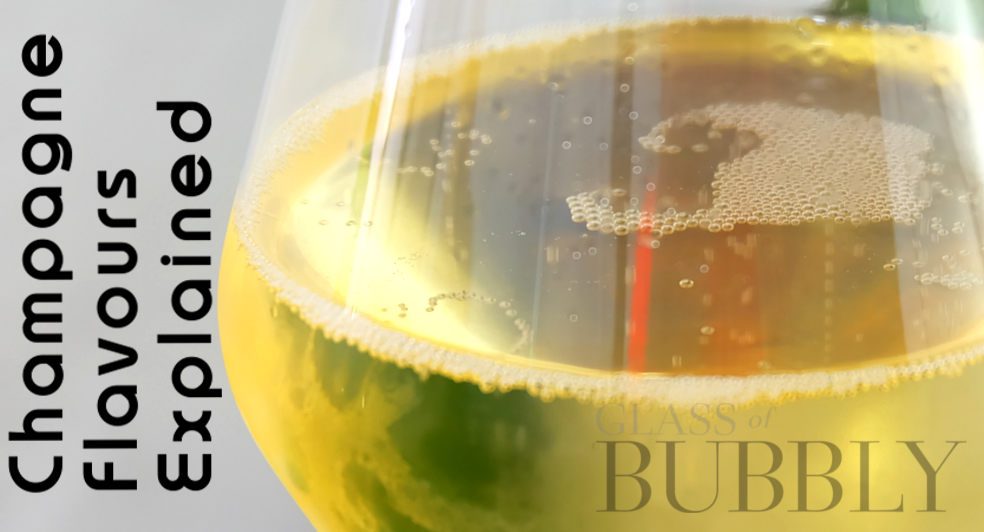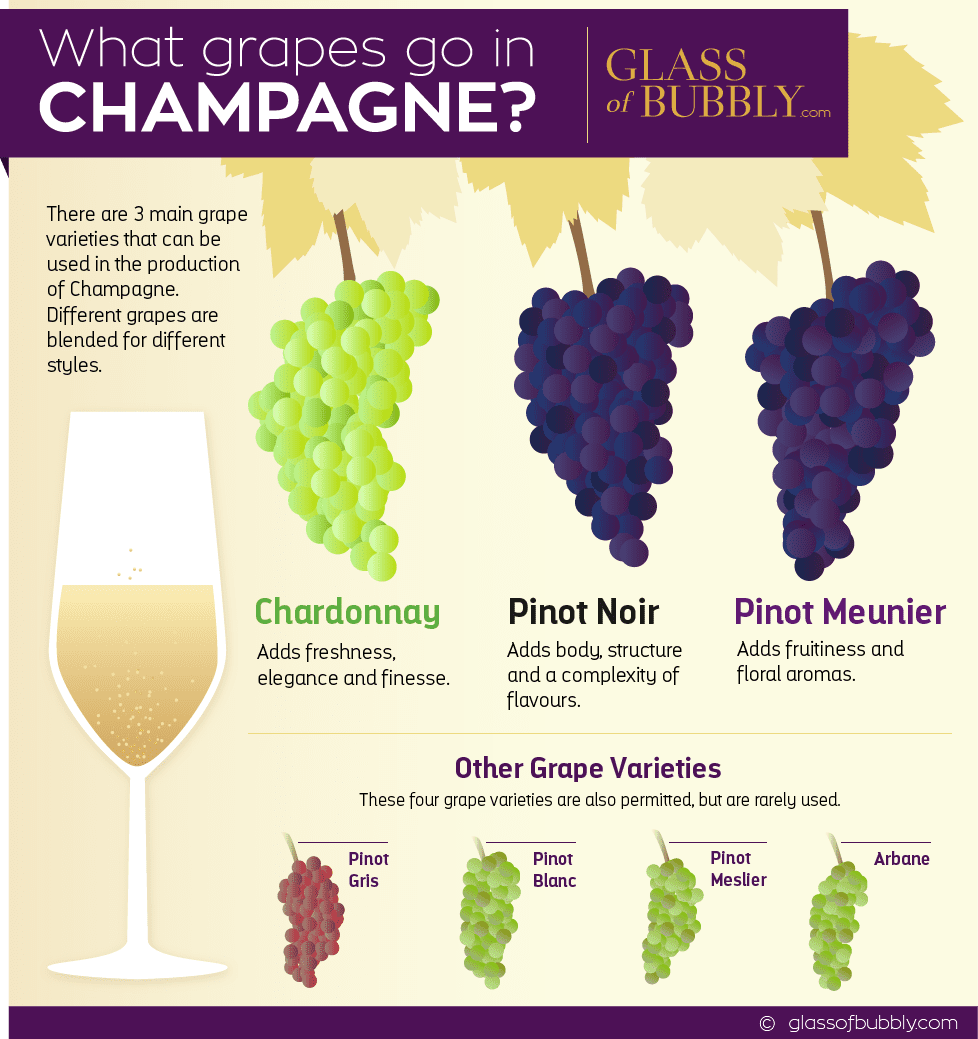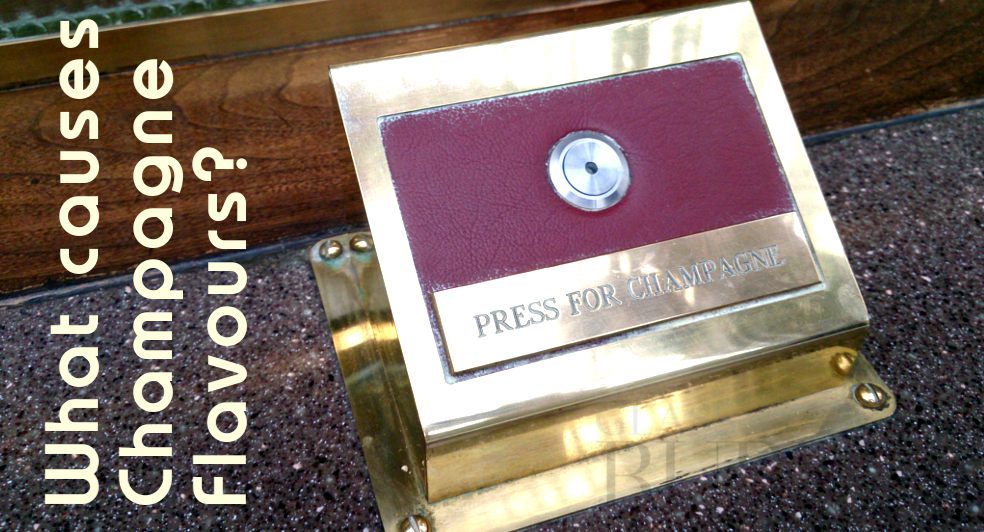Champagne Flavours Explained
31st March 2023

If you have ever wondered what Champagne tastes like then I hope this article will help you to understand what to expect and why. For those of us who have experienced Champagne already then this article will allow you to explore flavours you’ve yet to enjoy.
Champagne can offer a variety of flavours thanks to quite a few varying factors:
Terroir (land / weather / wine maker / wine making techniques)
Style (natural sugars / added sugars)
Blend (vintage of a single harvest / multi blends)
Age (recent release / senior vintage)
Grapes (Pinot Noir – (Pinot) Meunier – Chardonnay – Pinot Gris – Petit Meslier – Arbanne – Pinot Blanc)

Grapes that are allowed to go in to the making of Champagne
Many Champagne houses, these are the wineries themselves, will usually have a portfolio of labels sometimes extending into double digits. Most times they will have a Brut, Rosé, Extra Brut and Vintage / Special (Prestige) Cuvée though this can extend to many variations to express many different flavours – So not only are there thousands of Champagne producers, we can multiple this number by quite a few labels too!
“We have a splendid choice when we go shopping for Champagne. I have been to this wine growing region many times and I like to think that one can spend a lifetime exploring its wineries and wines.” Christopher Walkey
Not only does Champagne offer all the excitement of popping that cork and those bubbles in the glass, there are also exceptional flavours that we can enjoy. Just like most products in life, it is likely that the more you pay then the better quality you are likely to get. Also, the better you understand the product, the better choices you can make (for the money you are spending).
So, what about the flavours of Champagne?
From croissant to peach, saline to honeysuckle, the flavours are quite vast and are usually the cause of specific factors. Depending on your taste preference, you need to make the correct choice when purchasing Champagne to suit your palate as there are plenty of options. Many Champagne lovers will spend countless years exploring the variety of flavours from across the region whereas others have a preference and are likely to always stick with a label from a set Champagne house they know and trust.
Plenty of Champagne houses stick to a constant blend so as to deliver a consistent end wine each and every year for their main orders come in specifically based on the style they produce. When it comes to special releases and especially vintages, as the grapes used are all from one specific area (maybe even vineyard) / year, then the end flavour results are down to how mother nature has blessed the grapes. Single blends can vary, multi-blend wines can remain relatively consistent.
We can look at taste sensations of Champagne being sweet, bitter, salty and acidic. Most common / dominant flavours come from categories of:
Fruits – Apple / Pear / Peach / Melon etc.
Dried Fruits – Apricot / Peach / Raison / Prune etc.
Herbal – Leaves / Root / Woody etc.
Oak – Vanilla / Woody etc.
Citrus – Lemon / Lime / Grapefruit / Orange (peel) etc.
Red Fruits – Strawberry / Red Berries / Raspberry / Cherry / Plum etc.
Earthy / Minerals – Wet Stone / Saline / Chalky / Dust / Mushroom etc.
Floral – Honeysuckle / Rose Petals / Blossom etc.
Tertiary (Secondary) – Nutty / Pastry / Toast / Biscuit / Croissant etc.
Other – Honey / Cream / Spices etc.

What causes Champagne Flavours?
What causes the flavours of Champagne?
Terroir – Grapes – Production Process are the three main factors that have influence over the flavour of Champagne.
Terroir: This will primarily be the land which the vines are grown so we are looking at all that the roots pull in during their growth period and channelling of energy / water to the grapes.
Grapes: The grapes themselves will hold flavour characters and offer a spectrum of flavour levels depending on their ripeness and the seasonal weather they enjoyed.
Production Process: Once the grapes are picked then the full production process take places which additionally adds flavours to the Champagne including crushing techniques and blends, storage from oak (charred or not) to steel tanks and the style of yeast added to the length of time in the bottle with lees contact.
Terroir delivers taste sensations of: Herbal – Earthy / Minerals
Grapes delivers taste sensations of: Fruits – Citrus – Red Fruits – Floral – Dried Fruits
Production Process delivers taste sensations of: Oak – Tertiary – Other
![]()
Christopher Walkey
Co-founder of Glass of Bubbly. Journalist and author focused on Champagne & Sparkling Wines and pairing them with foods.
